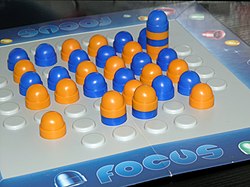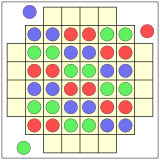Focus (game)
| Focus | |
|---|---|
 Kosmos edition from Focus |
|
| Game data | |
| author | Sid Sackson |
| graphic | Marion Pott , Karin Späth (Kosmos) |
| publishing company |
Whitman / Western Publishing (1965), Daekor Designs / Hudson's Bay (1979), Spear's Games (1979), Parker Brothers (1980), Milton Bradley (1982), Milton Bradley / Estrela , Kosmos (1995) |
| Publishing year | 1963 , 1965, 1979, 1980, 1982, 1995 |
| Art | Board game, strategy game |
| Teammates | 2 to 4 |
| Duration | 30 - 45 minutes |
| Age | from 10 years on
|
| Awards | |
|
Game of the year 1981 |
|
Focus is a strategy game for 2 to 4 people by the game designer Sid Sackson . It was first mentioned in Martin Gardner's 1963 Games column for Scientific American magazine . In 1965 it was published by Whitman / Western Publishing . In 1969 it is described in Sackson's book A Gamut of Games . In 1979 it was reappeared by Daekor Designs / Hudson's Bay Company and in the UK by Spear's Games . A German version was released by Parker Brothers in 1980 and was game of the year 1981. In 1982 the game was released in the United States by Milton Bradley as Domination and in Brazil by Milton Bradley / Estrela as Domínio . In 1995 a new German edition of Focus was published by Kosmos .
Rules for two players
The rules represent a further development of the game Laska .
- The game is played on a board with 6 × 6 fields and 4 additional fields on each side (see picture). At the beginning of the game, a stone is placed on each of the 6x6 middle fields so that the pattern shown is created.
- The stones are stacked on top of each other in the course of the game and form towers. A single stone is also referred to below as a tower of height one. A tower always belongs to the player who owns the top stone.
- The players take turns drawing. A move consists of either taking one or more stones from one of your own rooks and moving them to another space, or using one of your own stones that you have in a supply outside the board. This supply is empty at the beginning.
- A train moves the x top stones of a tower x spaces in a horizontal or vertical direction, i.e. H. the number of moving stones determines the distance over which they move. You can move to an empty space or to another tower, and jump over towers in between.
- A stone can be placed on any space, including your own or opposing towers.
- If a tower is built with more than five stones, the excess are removed from below. The removed stones go into the supply of the player who makes the move, as far as they are of his color. The other colored ones are removed from the game.
- The player who can make a move last wins.
The mathematician Paul Yearout has devised a so-called ox tour strategy . The player who is following always makes moves that maintain the symmetry of the position and cannot lose the game. Sid Sackson has developed two rule proposals as a countermeasure: either the game is counted as a victory for the newcomer at the end if the newcomer has only made symmetry moves, or at the beginning of the game two stones on the starting line-up are swapped so that the position is no longer symmetrical is. Both solutions can also be combined with one another.
variants
- This game was originally intended for two people. The game can also be played by three or four people. Then each player gets his own stone color and moves in turn. With four players, two players always form a team. Before the game it is agreed whether they can discuss their strategy during the game.
Sid Sackson added the variant for three people later. In the three-way version, you win if you could either capture three stones from each opponent or remove at least ten stones, including your own, from the board.
Prizes and awards
In 1981 Focus was voted Game of the Year . So far it has been the only abstract puzzle game that could reach this price. The rule of the game was given to the Essen pen in the same year .
Individual evidence
- ^ German translation: Games - different from others , Munich 1982, ISBN 3-88034-116-8 . Paperback: dtv 10185, Munich 1983, ISBN 3-423-10186-5 .
Web links
- Focus on game of the year
- Focus (1963) in the Luding games database
- Focus (1980) in the Luding games database
- Focus in the board game database BoardGameGeek (English)
- Domination aka Focus at Bob Claster (English)
- Focus at gamersalliance.com (English)


